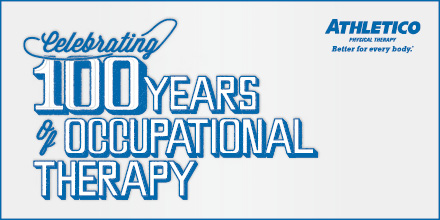
Occupational Therapy: Celebrating 100 Years
Leave a CommentJanine Palino, MOTS
University of St. Augustine
Occupational therapy helps people of all ages participate in the activities and tasks that are meaningful to them. These tasks range from washing hair and getting dressed to gardening and playing tennis.
 Occupational therapy can be found in a variety of places, including the medical field in circumstances like:
Occupational therapy can be found in a variety of places, including the medical field in circumstances like:
- Working with individuals after a stroke to be able to care for themselves again (i.e. brushing teeth, combing hair, shaving etc.).
- Working with individuals with a broken hand/elbow or with shoulder problems to be able to return to their prior level of function, including caring for themselves or participating in activities that are meaningful to them.
- Working with patients who have sustained significant burns to maintain motion in their arms and legs through the healing process.
Additionally, occupational therapists can be found in many other areas, such as:
- An office or warehouse, helping companies maintain proper ergonomics in order to prevent their workers from getting hurt on the job.
- A pediatric clinic, helping children who have difficulty processing different sensations, with handwriting or even with eating different foods.
- Helping return the injured worker back to work and to a productive member of society.

100 Years of Occupational Therapy
April 2017 marks the 100th anniversary of occupational therapy. During 1917, World War I was in full swing and occupational therapists were working to rehabilitate military personnel who were returning home. Occupational therapists helped these individuals to become independent through the use of tasks that were meaningful to them. Over the years, occupational therapy evolved, participating in the many movements that healthcare underwent, but never lost its focus on the person as a whole.
This year we celebrate what the profession of occupational therapy has become – a powerful, widely recognized, science driven, evidence-based, globally connected profession that meets an individual’s occupational needs. This was the Centennial Vision for the profession and we are happy to celebrate achieving it!
The Future of Occupational Therapy
Building on the successes of the Centennial Vision, the American Occupational Therapy Association (AOTA) has presented Vision 2025 to guide the profession beyond 2017. Vision 2025 states: “Occupational therapy maximizes health, well-being, and quality of life for all people, populations, and communities through effective solutions that facilitate participation in everyday living.”1
Looking into the future, occupational therapists will continue to focus on bettering the profession in order to meet the needs and standards that patients deserve. Together, we can help one another to be the best that we can be!
The Athletico blog is an educational resource written by Athletico employees. Athletico bloggers are licensed professionals who abide by the code of ethics outlined by their respective professional associations. The content published in blog posts represents the opinion of the individual author based on their expertise and experience. The content provided in this blog is for informational purposes only, does not constitute medical advice and should not be relied on for making personal health decisions.
References
- American Occupational Therapy Association. (2017). AOTA.org
- Schell, B. A. B., Gillen, G., & Scaffa, M. E. (Eds.) (2014). Willard and Spackman’s occupational therapy (12th ed). Philadelphia, PA: Lippincott Williams & Wilkins.
